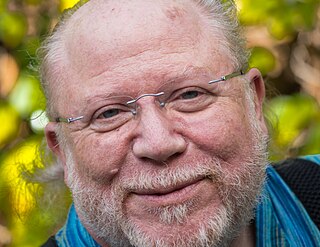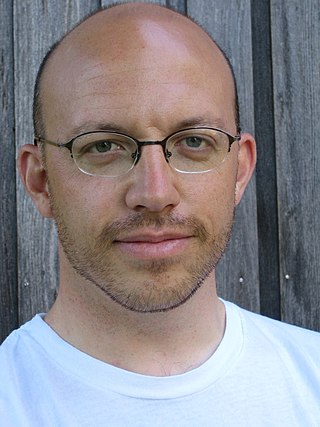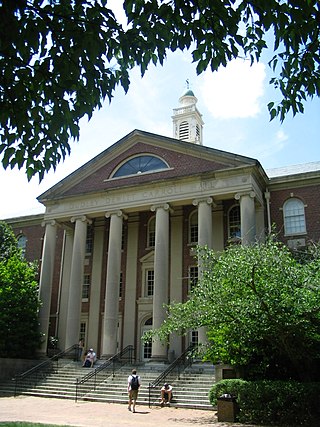Related Research Articles

The Medill School of Journalism, Media, Integrated Marketing Communications is a constituent school of Northwestern University that offers both undergraduate and graduate programs. It frequently ranks as the top school of journalism in the United States. Medill alumni include over 40 Pulitzer Prize laureates, numerous national correspondents for major networks, many well-known reporters, columnists and media executives.

The Columbia University Graduate School of Journalism is located in Pulitzer Hall on the university's Morningside Heights campus in New York City. Founded in 1912 by Joseph Pulitzer, Columbia Journalism School is one of the oldest journalism schools in the world and the only journalism school in the Ivy League. It offers four graduate degree programs.

John Shively Knight was an American newspaper publisher and editor based in Akron, Ohio.

Eric Newton is an American journalist, writer and media consultant.

The Knight Science Journalism program offers 9-month research fellowships, based at its headquarters at the MIT School of Humanities, Arts, and Social Sciences, to elite staff and freelance journalists specializing in coverage of science and technology, medicine, or the environment. Fellows are chosen from an international application pool in a competitive process each spring, and reside in Cambridge, Massachusetts, for two semesters of audited coursework and research at MIT, Harvard, and surrounding institutions.

T. Christian Miller is an investigative reporter, editor, author, and war correspondent for ProPublica. He has focused on how multinational corporations operate in foreign countries, documenting human rights and environmental abuses. Miller has covered four wars — Kosovo, Colombia, Israel and the West Bank, and Iraq. He also covered the 2000 presidential campaign. He is also known for his work in the field of computer-assisted reporting and was awarded a Knight Fellowship at Stanford University in 2012 to study innovation in journalism. In 2016, Miller was awarded the Pulitzer Prize for Explanatory Journalism with Ken Armstrong of The Marshall Project. In 2019, he served as a producer of the Netflix limited series Unbelievable, which was based on the prize-winning article. In 2020, Miller shared the Pulitzer Prize for National Reporting with other reporters from ProPublica and The Seattle Times. With Megan Rose and Robert Faturechi, Miller co-won the 2020 award for his reporting on United States Seventh Fleet accidents.
Glenn Frankel is an American author and academic, journalist and winner of the 1989 Pulitzer Prize for International Reporting. He spent 27 years with The Washington Post, where he was bureau chief in Richmond (Va.), Southern Africa, Jerusalem and London, and editor of The Washington PostMagazine. He served as a visiting journalism professor at Stanford University and as Director of the School of Journalism at the University of Texas at Austin. Author of five books, his latest works explore the making of an iconic American movie in the context of the historical era it reflects. In 2018 Frankel was named a Motion Picture Academy Film Scholar. He was named a 2021-2 research fellow of the Leon Levy Center for Biography at the City University of New York for a book about Beatles manager Brian Epstein.
Michael Thomas Vitez is an American Pulitzer Prize-winning journalist and author. He is the son of immigrants, his father having fled from Budapest, Hungary in 1939, and his mother came to America from Europe as a German Jew in 1941; both leaving their homeland to escape from Hitler's reign. He is the Director of Narrative Medicine at the Lewis Katz School of Medicine at Temple University, after serving as a journalist over a three decade career (1985-2015) with The Philadelphia Inquirer.

The UNC Hussman School of Journalism and Media is a nationally accredited professional undergraduate and graduate level journalism school at the University of North Carolina at Chapel Hill. The school, founded in 1950, is ranked competitively among the best journalism schools in the United States. The school offers undergraduate degrees in media & journalism as well as advertising & public relations. It offers master's degrees in journalism, strategic communication, and visual communication and doctoral degrees in media & communication.
Bob Drogin is an American journalist and author. He worked for the Los Angeles Times, for nearly four decades. Drogin began his career with the Times as a national correspondent, based in New York, traveling to nearly every state in the United States. He spent eight years as a foreign correspondent, and as bureau chief in Manila and Johannesburg, before returning to the U.S. He covered intelligence and national security in the Washington bureau, from 1998 until retiring in November 2020.

Dori J. Maynard was an American writer and journalist. She was the president of the Robert C. Maynard Institute for Journalism Education in Oakland, California and the co-author of Letters to My Children, a compilation of nationally syndicated columns by her late father Robert C. Maynard, for which she wrote introductory essays.

Sheri Fink is an American journalist who writes about health, medicine and science.
Joshua Friedman is an American journalist who worked 32 years for newspapers and won a Pulitzer Prize in 1985. He formerly chaired the Committee to Protect Journalists and directed International Programs at Columbia University Graduate School of Journalism. At the journalism school he also directed the Maria Moors Cabot Prize, inaugurated in 1939, which annually recognizes outstanding coverage of the Americas by journalists based there. He worked at Columbia as either full-time or adjunct faculty since 1992. European Journalism Centre (EJC) and the Georgian Institute of Public Affairs (GIPA), established the annual GIPA-Friedman prize in 2012 to honor the excellence in journalism in the South Caucasus country. Friedman is on the board of the committee to Protect Journalists and served as an early chair of CPJ. He is on the advisory board of the Dart Center on Journalism and Trauma. Friedman currently serves as vice-chair at the Carey Institute for Global Good and is also on the advisory board of the institute's Nonfiction Program.
The Knight-Wallace Fellowship is an award given to accomplished journalists at the University of Michigan. Knight-Wallace Fellowships are awarded to reporters, editors, photographers, producers, editorial writers and cartoonists, with at least five years of full-time, professional experience in the news media.
Robert Skinner Boyd was an American journalist who spent most of his career working for the Knight Newspaper Group, spending two decades as the group's Washington bureau chief. He and Clark Hoyt won a Pulitzer Prize in 1973 for uncovering the fact that Senator Thomas Eagleton, George McGovern's choice for vice president, had had severe psychiatric problems and undergone three shock treatments. Instead of publishing their scoop, they disclosed their findings to McGovern's top advisor, and Eagleton withdrew as the Democratic nominee.

Jacqueline Marie Banaszynski is an American journalist. She was the winner of the Pulitzer Prize for Feature Writing in 1988. Banaszynski went on to become a professor and a John S. and James L. Knight Foundation Chair at the school of journalism at University of Missouri.

Sandra Mims Rowe is an American journalist. She is the former editor of The Virginian-Pilot in Norfolk, Virginia, and of The Oregonian, in Portland, Oregon. She was one of the few women editors of metro newspapers in the 1980s, and was the first woman editor at The Virginian-Pilot and The Oregonian. She was the second female president of the American Society of News Editors, a decade after Kay Fanning, the editor of The Christian Science Monitor, was the first.

Tom Hamburger is an American journalist. He is an investigative journalist for The Washington Post. He is a 2018 Pulitzer Prize and George Polk Award recipient and a political analyst for MSNBC.
James V. Risser is an American journalist and Emeritus Professor of Communication at Stanford University.
References
- ↑ Hachten, William A. (2005). The Troubles of Journalism: A Critical Look at What's Right and Wrong With the Press, p. 176. Routledge.
- ↑ John S. Knight Fellowships at Stanford. "Become a Fellow". Retrieved 27 November 2015.
- 1 2 Evans, Erica (26 October 2014). "Stanford Knight journalism fellowship receives $1.8 million grant to expand its initiatives". Stanford Daily . Retrieved 27 November 2015.
- ↑ Pulitzer.org. "The 2004 Pulitzer Prize Winners: Beat Reporting: Daniel Golden". Retrieved 27 November 2015.
- ↑ Brennan, Elizabeth A. and Clarage, Elizabeth C. (1999). Who's who of Pulitzer Prize Winners, p. 468. Greenwood Publishing Group
- ↑ Hirsch, Arthur (3 October 1999). "Man Troubles". Baltimore Sun .